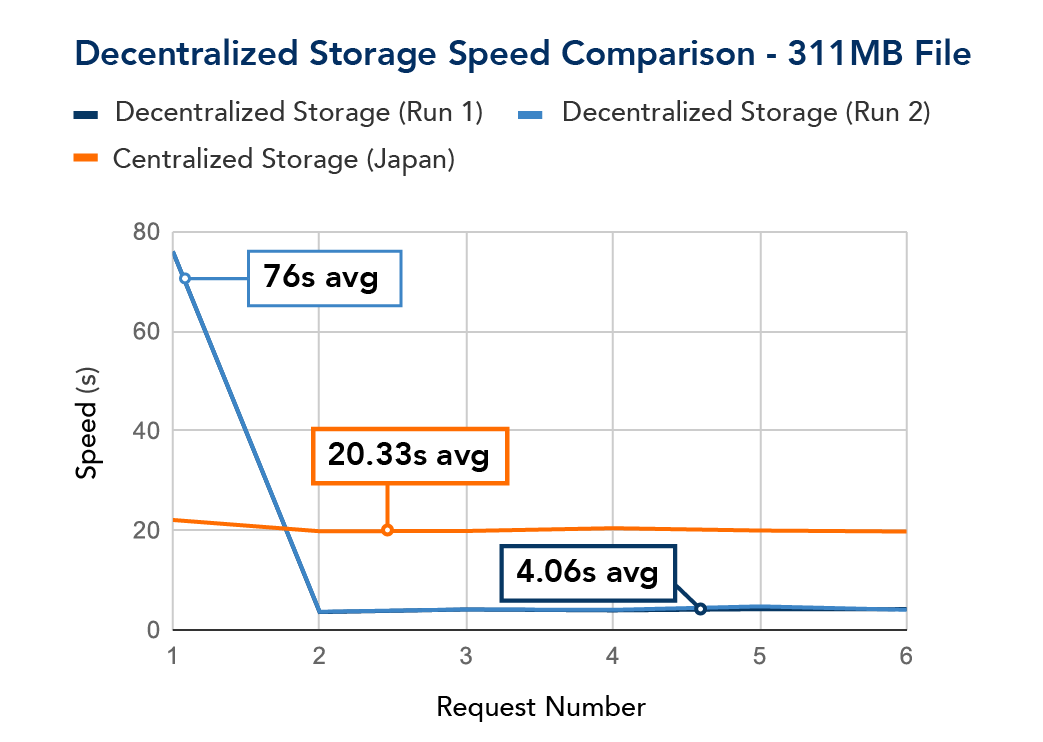Testing decentralized storage speed
Long time VIA blog readers will know that VIA focuses on military-grade and enterprise-grade Web3 components for data privacy like zero-knowledge proofs. But where is all that data stored? In the Web3 world, IPFS is a standard for decentralized storage. Is a private version of decentralized storage ready for the enterprise?
We’re going to focus on speed. Decentralized storage has claims of being faster than centralized storage. We decided to test that with our own private deployment of decentralized storage and publish the results for you.
For our testing, we put four files of different sizes (114 bytes, 6.2Mb, 311 MB, and 933 MB) on a node in Japan. We also created a node in our local region of the East Coast of North America.
As expected, the download times for when we accessed the file without a local node varied by file size. The download times for each file size was relatively consistent:
| File Size | Average | Range |
|---|---|---|
| 114 bytes | 292ms | 288ms to 293ms |
| 6.2 Mb | 1.84s | 1.58s to 2.14s |
| 311 MB | 20.33s | 19.77s to 22.09s |
| 933 MB | 62.67s | 60s to 65s |
In comparison, decentralized storage was:
- Significantly faster on all downloads for a smaller file (initial download and subsequent downloads)
- Slower on initial download for larger files
- Significantly faster on subsequent downloads for larger files
Here are the times for the initial file downloads:
| File Size | Average | Range |
|---|---|---|
| 114 bytes | 155ms | 155ms |
| 6.2 Mb | 2.6s | 2.5s to 2.7s |
| 311 MB | 76s | 76s |
| 933 MB | 237.5s | 235s to 240s |
Here are the times for subsequent file downloads:
| File Size | Average | Range |
|---|---|---|
| 114 bytes | 9.45ms | 3ms to 36ms |
| 6.2 Mb | 70.6ms | 49ms to 109ms |
| 311 MB | 4.06s | 3.59s to 4.74s |
| 933 MB | 17.28s | 15s to 19.11s |
Of course, it’s not just that the same user would receive faster downloads for the same file on subsequent attempts. As Web3 pros will know, any authorized user nearby would get routed to the local node and therefore benefit from the increased speeds. The greater the number of users in different locations, the greater this benefit.
In the context of a private decentralized storage deployment, administrators can force nodes to clean up and remove files when needed if they don’t want something in one location. Administrators can also “pin” content to a specific node (location) if they want to make sure something is always available.
For you visual learners, here are the summary results:

Watch a quick demo video below:
Our takeaway is that decentralized storage has a speed advantage over centralized storage for enterprises where:
- There is a highly geographically distributed user base
- There is interest in dynamically allocating files to specific locations to optimize file download times
Follow VIA’s website and social media (LinkedIn, Twitter, Instagram, and Threads) to catch the latest!








